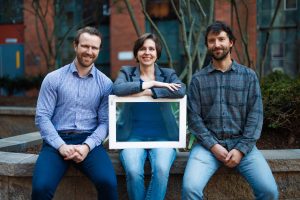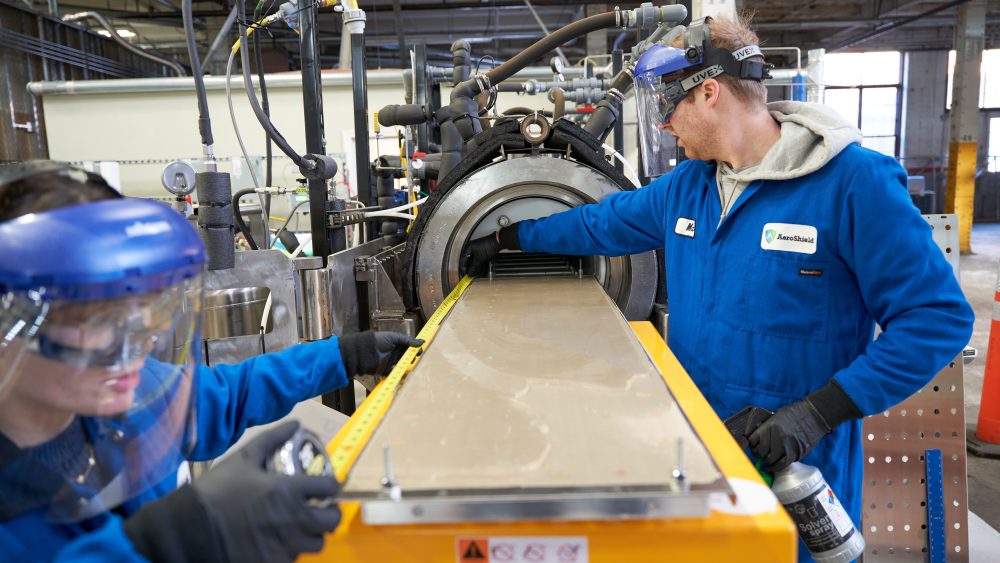Before AeroShield was turning transparent nanomaterials into energy savings, it was looking for the right partners to prove its potential. That search led them to the Wells Fargo Innovation Incubator (IN2).
“When you’re a startup, especially one with a new technology, there’s a top tier of incubator programs, and IN2 is on that list,” said AeroShield Co-founder and Vice President of Operations Aaron Baskerville-Bridges. “If you’re trying to validate performance, IN2 has to be one of your first applications.”
AeroShield developed transparent, super-insulating materials—including a silica aerogel—to enable the next generation of energy-efficient windows. The startup creates sheets of aerogel that are bonded to glass, forming a coated glass product that can improve a window’s energy efficiency by about 65%.
“The aerogel’s nanostructure reduces a traditional window’s heat loss by two to three times,” said AeroShield Chief Executive Officer Elise Strobach. “Its tiny pores trap hot or cold air, preventing it from moving around or losing energy through the window and creating a super-insulating layer, kind of like glass Styrofoam. By making the windows more insulating, it takes less energy to keep the temperature in a room comfortable.”

AeroShield’s co-founders with their revolutionary ultra-clear silica aerogel. From left to right: Aaron Baskerville-Bridges, VP of Operations & Co-founder; Elise Strobach, CEO & Co-founder; Kyle Wilke, CTO & Co-founder. Photo courtesy of AeroShield
AeroShield worked closely with experts at NREL as part of the IN2 program, which is funded by Wells Fargo & Company. NREL also connected AeroShield’s team with Lawrence Berkeley National Laboratory (LBNL), known for its window research, to further support product development.
“LBNL gave us invaluable guidance on how to design and manufacture a high-performance window,” Baskerville-Bridges said. “They tested prototypes for thermal performance, and NREL took the technical validation further. They used ReStock™ and ComStock™ to model building-level energy performance. NREL was able to tell us: This is the performance of your windows. This is what it means in terms of energy savings, and this is what it means in terms of dollar savings. That quantifiable data is now central to our pitch presentation.”
Since its time in IN2, AeroShield has grown to 25 full-time employees and opened a pilot facility in Waltham, Massachusetts, to manufacture sliding glass doors and other predominantly glass doors used in home entries, all featuring aerogel windows.
“It is normally harder to make energy-efficient glass for doors than it is for windows, since the thickness can’t be changed and weight is a major issue,” Baskerville-Bridges said. “AeroShield is the perfect solution to provide improved performance without thickness or weight increases, and it’s a great beachhead market since sizes are more standardized.”
AeroShield is now expanding their manufacturing capacity with the support of a $14 million ARPA-E SCALEUP award to bring these products to market. “Our new facility will enable product launch for entry and patio doors, and we will also be using that facility to produce windows and even retrofits that go on top of existing windows,” Strobach said.
AeroShield aims to sell its technology to window and door manufacturers, as well as other customers, by 2026.
“With this resource and backing, we’re ready to deploy it and make it work,” Strobach said.
Baskerville-Bridges attended NREL’s Industry Growth Forum (IGF) in March 2025, which facilitates one-on-one meetings between startups and motivated investors. AeroShield met with at least 10 investors during the event.
“IGF is also a great place to catch up with others in the window space,” Baskerville-Bridges said. “We talked in great detail with our peers about innovations in framing and other parts of the window. It really got our wheels turning. There are so many ways in which you can combine technologies.”
Strobach echoes the importance of NREL’s early support through the IN2 program, acknowledging that AeroShield would not be where it is now without the assistance.
“When you’re a startup, you think you know some things and don’t know others,” Strobach said. “What IN2 did for us was encourage us to ask those questions and challenge our perceptions. IN2 held our hands in the early days and made us feel like we could do this. It trained us to think with the customer and end user in mind from the beginning. I don’t know if any of this would have been possible without IN2 giving us that foundation.”

Comments are closed.